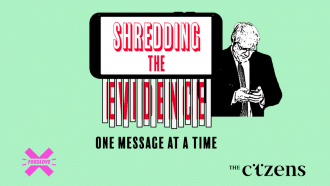It’s official – Government by WhatsApp is going to court
In October, Foxglove walked into a courtroom for the first time since the pandemic – watch this video from outside the High Court in London (with vintage grey English skies).
And we were successful! With our partners, the Citizens, we’ve won formal permission to proceed to a full judicial review. The government will now have to answer for its shambolic WhatsApp policies in court.
Lots of you supported us to get here – so we thought we’d give you a flavour of how it went on the day and explain what we’ve learned in this litigation so far.
The hearing exposed some worrying evidence. The government had to give us several previously-secret policies that deal with government by WhatsApp or personal email.
These rules, it turns out, are a hopeless morass that put the public record at real risk of destruction.
A couple of key facts have come out of the case so far.
Top of the list was the revelation that, after the 2019 election, a secret policy in Boris Johnson’s name was sent to cabinet ministers. It banned the use of personal email, phones and messaging apps for all government business.
The PM’s rule says: “Your personal IT will not be as secure as Departmental IT. You should not use your personal devices, email and communications applications for Government business at any classification.”
Surprised to hear Boris Johnson’s own rules already ban personal email and WhatsApp? So were we. The rule is clearly being flouted across Whitehall – but government lawyers admitted it’s there on the books.
To try and get round this, government counsel argued the courts had no power to enforce the rule – in practical terms, that rules are there for ministers to follow when convenient.
The PM’s rule also says: “Use of personal or Parliamentary email accounts for OFFICIAL contravenes government policy and action will be taken where it is discovered.”
If this has ever been enforced against a minister, the government hasn’t said so.
We suspect that’s because it hasn’t.
So we were pleased when the judge rejected the government’s suggestion that the Court had no role to play. Holding the government to its own standards is a basic tenet of the rule of law.
We’ve also asked the other side to hand over evidence of how often this sort of thing has been happening in the Cabinet Office and central government. Now that we’re going to full judicial review, the government will have to answer.
On top of that, the government revealed details to us about how it handles instant messages on official phones – via Google Chat – at the Cabinet Office.
The Cabinet Office’s duty is to support the Prime Minister and government as a whole. So it’s fair to assume that messages pinging round their chatrooms every day concern government business that affects us all.
Are the messages saved? No. Turns out the Cabinet Office’s policy is that every instant message – from its top minister down to the most junior civil servant – must be automatically deleted at the end of each conversation.
So let’s get this straight. On the one hand, the government has a rule on personal email and WhatsApp – they should not be used – but, confusingly, another rule requires insta-deletion of all government chats.
We think these policies are a mess – a mess that explains why so much important government business is happening on private side channels.
We’ve all seen the reports: from the PM helping Saudi princes bidding for Newcastle United, to fretting that Matt Hancock was “f***ing hopeless”, or ministers fielding lobby texts from David Cameron for dodgy money man Lex Greensill. Much of modern government seems to be happening over private messages.
And, of course, we know WhatsApp was used in every part of the pandemic response.
We’re deeply concerned that vital evidence about how the government handled the pandemic has already been lost and can never be brought before a public inquiry.
That is the point of this case. When so many have lost so much, the public must be able to trust the record is complete. On Covid, that means ensuring that the inquiry can access the full evidence of how government made its decisions.
A vanishing record makes it impossible to hold our representatives to account. It means we can’t learn from history. That’s why we’re going to court.
Hit the button below to sign our petition and support this case.

